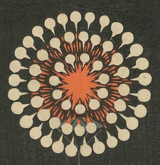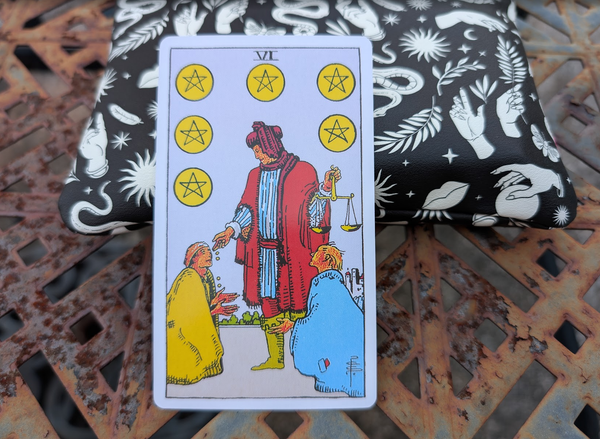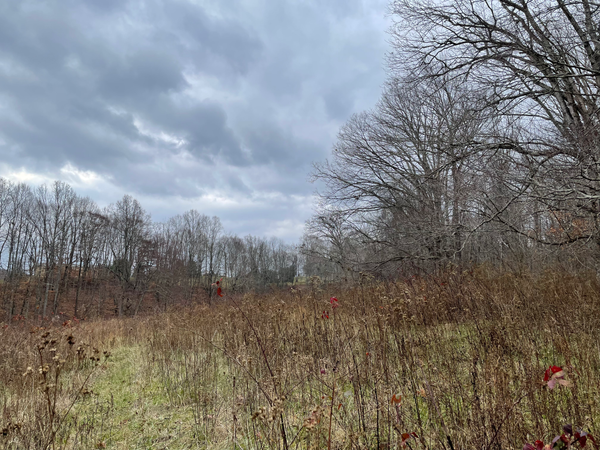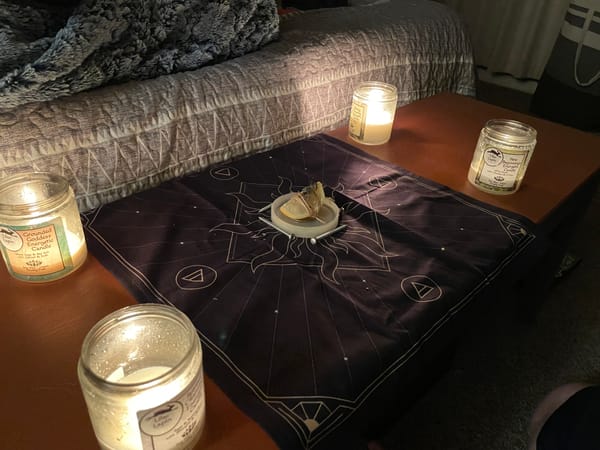I feel like a fraud.
Content Warning: religious trauma, cults.

The tension I feel most days:
A die-hard skeptic, and an eager seeker of magic and the divine.
I have an experience as a child—we were moving across state lines and we packed up our belongings and drove from somewhere in the Midwest to southern California. The route took us through New Mexico. Even though I was young, probably around 8 years old, I was aware of the earth and something magical about that place. I now know of vortexes and energy portals, but of course I had no idea of that as a kid; but I was aware of something. I could sense it. It snatched my imagination and grabbed a hold of my spirit. Even though we spent little time in the state, it made an impact on me. New Mexico has been special to me and I've never been back.
Add 40 years to my life and I am still trying to understand what that experience was and how I relate to it. One can see how I feel into religion; seeking the divine tends to get you there; assuming you are around others that feel they know the mind of God and can tell you how and why to serve Him. <sarcasm>
After two decades of following Christianity, and being out of it for about 5 years, I can say that the original feeling (sensations?) of New Mexico are still there. I still want to find that sacred energy, that mystical place that grabs me by the soul and connects me to all that I see and know. I am still seeking.
However...
Walking away from institutional Christianity leaves a mark. A deep one, if you were in or adjacent to fundamental evangelicalism. If you want to get insight on what it was like, have a listen to a podcast called: The Rise and Fall of Mars Hill. (While Mars Hill wasn't the church I belonged to, the one I was at, was very much a sister church of theirs, with many shared connections.) I struggled early on with the teachings and positions of the conservative right. I still was around and loved people that had deeply held beliefs in it. At the time, I wasn't an ally to the LGBTQ+ community, though I wasn't necessarily against them either. It was only a matter of time before I reconciled with my own conscience and its call to support and affirm all life, including LGBTQ+ community, and to reject the hate and teachings that divide us. And so, I left institutional Christianity, and with it, the community I was so heavily invested in. It HURT, but it was the RIGHT thing to do.
What does that wound look like? Distrust. Hesitancy. Reservation. What do I want in terms of healing? Feeling and being alive. I want to have imagination and magic. I want my spirit to dance!
Fast forward to now; and this journey I am on, exploring various traditions and trying to build a craft for myself that is meaningful. A craft that honors myself and others and increases the good in the world. Where is the tension you might ask?
I recently found a podcast called Heaven's Gate, about the religious group of the same name.

I am totally enthralled with the story. Yet, I can't help but hear a whisper in it... A kind of warning, perhaps. You see, I relate to those that were members of Heavens Gate. They too, were seekers. The Wound™️ (mentioned above) wants to "protect" me. It tells me these people were deluded, and I am not careful, I too will be deluded, you know, like I was; Christianity is a cult too, after all.
I had the same experience watching Mother God.
Documentary on Mother God
I was shocked to find myself relating to those that were seekers in this story too. Am I really that gullible? I currently find myself, making progress in discovering my craft, and resisting the pursuit at the same time; I don't want to be duped again for another system of belief.
It makes me feel like a fraud.
I am reminding by a quote from Nick Cave, in his book, Faith, Hope and Carnage.
Nick Cave on the death of his son Arthur.
"Arthur’s death literally changed everything for me. Absolutely everything. It made me a religious person. I am not talking about being a traditional Christian. I am not even talking about a belief in God, necessarily. It made me a religious person in the sense that I felt, on a profound level, a deep inclusion in the human predicament, and an understanding of our vulnerability and the sense that, as individuals, we are, each of us, imperilled. Each life is precarious, and some of us understand it and some don’t. I became a person after my son died.
The world seemed to vibrate with a peculiar, spiritual energy. I was genuinely surprised by how susceptible I became to a kind of magical thinking. How readily I dispensed with that wholly rational part of my mind and how comforting it was to do so. Now, that may well be a strategy for survival and, as such, a part of the ordinary mechanics of grief, but it is something that persists to this day. Perhaps it is a kind of delusion, I don’t know, but if it is, it is a necessary and benevolent one.
Things happen in your life, terrible things, great obliterating events, where the need for spiritual consolation can be immense, and your sense of what is rational is less coherent and can suddenly find itself on very shaky ground. I think of late I’ve grown increasingly impatient with my own skepticism; it feels obtuse and counter-productive, something that’s simply standing in the way of a better-lived life. I love this world — with all its joys and its vast goodness, its civility and complete and utter lack of it, its brilliance and its absurdity. I love it all, and the people in it, all of them. I feel nothing but deep gratitude to be a part of this whole cosmic mess.
I don’t know how to exactly say this, and please don’t misunderstand it, but since Arthur died I have been able to step beyond the full force of the grief and experience a kind of joy that is entirely new to me. It was as if grief enlarged my heart in some way. I have experienced periods of happiness more than I have ever felt before, even though it was the most devastating thing ever to happen to me.
This is Arthur’s gift to me, one of the many. It is his munificence that’s made me a different person. I say all this with huge caution and a million caveats, but I also say it because there are those who think there is no way back from the catastrophic event. That they will never laugh again. But there is, and they will."
There is one line in there that makes me continue in this process:
I've grown increasingly impatient with my own skepticism.
Perhaps I am not a fraud. Perhaps this tension is necessary for me to be my most authentic self.






